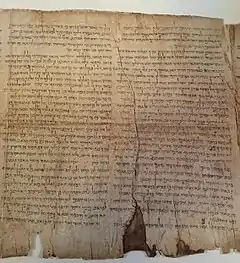Isaiah 14
Isaiah 14 is the fourteenth chapter of the Book of Isaiah in the Hebrew Bible or the Old Testament of the Christian Bible. This book contains the prophecies attributed to the prophet Isaiah, and is one of the Books of the Prophets.
| Isaiah 14 | |
|---|---|
 Photo of Great Isaiah Scroll facsimile, showing columns 12-13 (Isaiah 14:1-16:14). | |
| Book | Book of Isaiah |
| Hebrew Bible part | Nevi'im |
| Order in the Hebrew part | 5 |
| Category | Latter Prophets |
| Christian Bible part | Old Testament |
| Order in the Christian part | 23 |
Text
The original text was written in Hebrew language. This chapter is divided into 32 verses.
Textual witnesses
Some early manuscripts containing the text of this chapter in Hebrew are of the Masoretic Text tradition, which includes the Codex Cairensis (895), the Petersburg Codex of the Prophets (916), Aleppo Codex (10th century), Codex Leningradensis (1008).[1]
Fragments containing parts of this chapter were found among the Dead Sea Scrolls (3rd century BCE or later):[2]
- 1QIsaa: complete
- 4QIsac (4Q57): extant verses 1-5, 13
- 4QIsal (4Q65): extant verses 1‑12, 21‑24
- 4QIsao (4Q68): extant verses 28‑32
There is also a translation into Koine Greek known as the Septuagint, made in the last few centuries BCE. Extant ancient manuscripts of the Septuagint version include Codex Vaticanus (B; B; 4th century), Codex Sinaiticus (S; BHK: S; 4th century), Codex Alexandrinus (A; A; 5th century) and Codex Marchalianus (Q; Q; 6th century).[3]
Parashot
The parashah sections listed here are based on the Aleppo Codex.[4] Isaiah 14 is a part of the Prophecies about the Nations (Isaiah 13–23). {P}: open parashah; {S}: closed parashah.
- [{S} 13:6-22] 14:1-2 {S} 14:3-27 {P} 14:28-32 {P}
Verses 4–21
The song in verses 4b–21 could be secondarily applied to Sargon II, who died in 705 BCE and his body was never recovered from the battlefield. Here, Sargon ("King of Assyria" in Isaiah 20:1) is called the "King of Babylon" because from 710–707 BCE he ruled in Babylon and even reckoned his regnal year on this basis (as seen in Cyprus Stela, II. 21–22).[5]
Verse 12
- "How you are fallen from heaven,
- O Lucifer, son of the morning!
- How you are cut down to the ground,
- You who weakened the nations!"[6]
- "Fallen from heaven": see Luke 10:15, 18 for the words of Jesus Christ regarding the fall of Satan.
- "Lucifer" or "Day-star" (Hebrew: הילל hēylēl, from הלל hâlal, "to shine"). The Septuagint renders it, Ἑωσφόρος Heōsphoros, and Jerome in the Vulgate, "Lucifer, the morning star"; in the Chaldee, "How art thou fallen from high, who wert splendid among the sons of men." The New Oxford Annotated Bible suggests the correlation with "a Canaanite myth of the gods Helel and Shahar (Morning Star and Dawn), who fall from heaven as a result of rebellion."[7]
Verse 29
- Do not rejoice, all you of Philistia,
- Because the rod that struck you is broken;
- For out of the serpent’s roots will come forth a viper,
- And its offspring will be a fiery flying serpent.[8]
- "Philistia": from Hebrew: פְלֶ֙שֶׁת֙, p̄ə-le-šeṯ,[9] KJV renders it as "Palestina", not in the wider meaning as today, but specifically as 'the country of the Philistines'.[10]
See also
References
- Würthwein 1995, pp. 35-37.
- Ulrich 2010, p. 356-359.
- Würthwein 1995, pp. 73-74.
- As implemented in the Jewish Publication Society's 1917 edition of the Hebrew Bible in English.
- Younger, K. Lawson, Jr. (2003). "Recent Study on Sargon II, King of Assyria: implications for Biblical studies". In Chavalas, Mark W.; Younger, K. Lawson, Jr. (eds.). Mesopotamia and the Bible. Journal for the Study of the Old Testament Supplement (Library of Hebrew Bible/Old Testament Studies). 341 (reprint ed.). A&C Black. p. 319. ISBN 978-0567082312.
- Isaiah 14:12 NKJV
- The New Oxford Annotated Bible with the Apocrypha, Augmented Third Edition, New Revised Standard Version, Indexed. Michael D. Coogan, Marc Brettler, Carol A. Newsom, Editors. Publisher: Oxford University Press, USA; 2007. pp. 998-1000 Hebrew Bible. ISBN 978-0195288810
- Isaiah 14:29 NKJV
- Hebrew Text Analysis: Isaiah 14:29. Biblehub
- Ellicott, C. J. (Ed.) Ellicott's Bible Commentary for English Readers. Isaiah 14. London : Cassell and Company, Limited, [1905-1906] Online version: (OCoLC) 929526708. Accessed 28 April 2019.
Bibliography
- Ulrich, Eugene, ed. (2010). The Biblical Qumran Scrolls: Transcriptions and Textual Variants. Brill.CS1 maint: ref=harv (link)
- Würthwein, Ernst (1995). The Text of the Old Testament. Translated by Rhodes, Erroll F. Grand Rapids, MI: Wm. B. Eerdmans. ISBN 0-8028-0788-7. Retrieved January 26, 2019.CS1 maint: ref=harv (link)
External links
- Jewish
- Christian